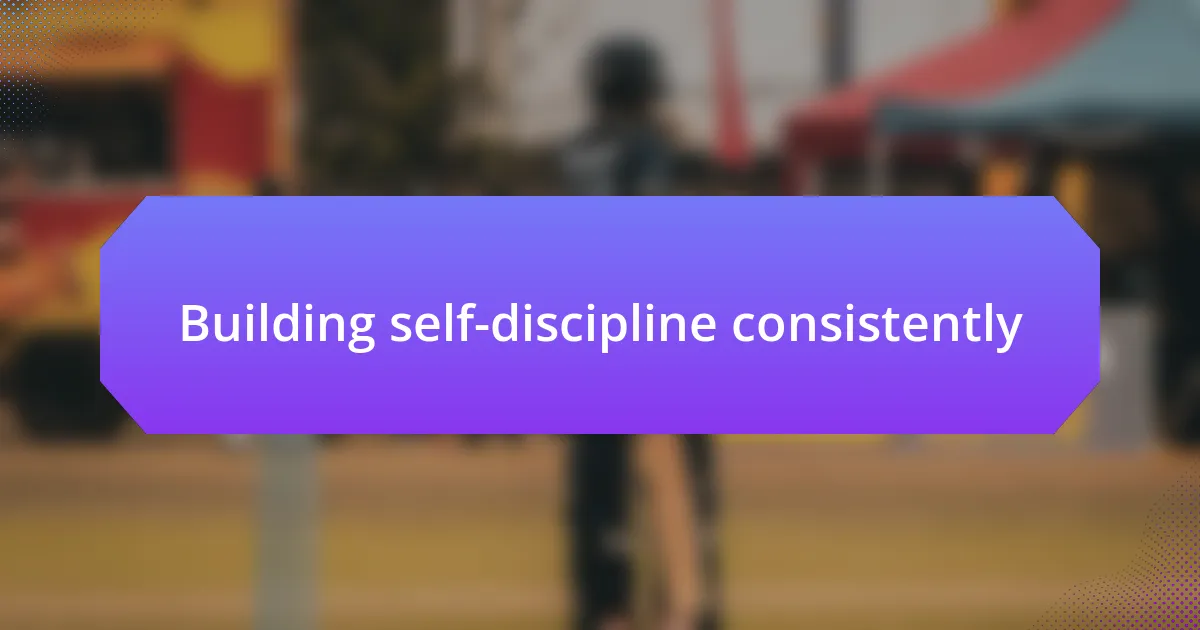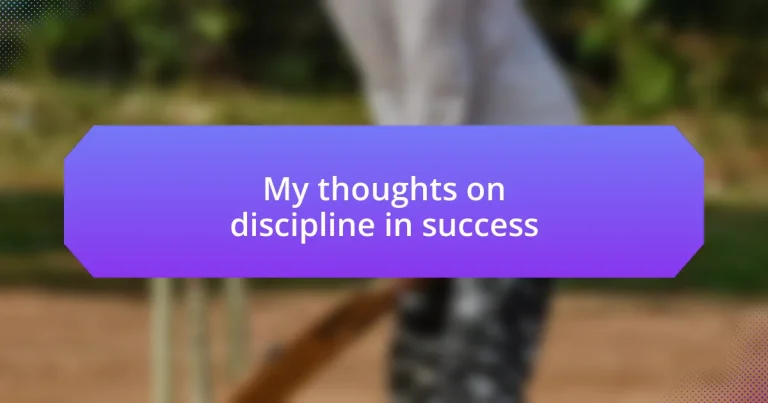Key takeaways:
- Discipline fosters self-control and perseverance, bridging the gap between goals and achievements.
- Building self-discipline involves setting clear objectives, creating manageable tasks, and tracking progress.
- Mindfulness, motivational cues, and a reward system can significantly enhance personal discipline.
- Overcoming challenges like self-doubt and external pressures requires sharing goals and viewing mistakes as growth opportunities.

Understanding discipline and success
Discipline is often seen as a strict regimen, but to me, it’s more about self-control and commitment. I remember a time in my life when I set a challenging goal—running a marathon. The discipline I developed through consistent training transformed not just my body but my mindset, teaching me the importance of perseverance in achieving success.
Success doesn’t come from sheer talent; it’s often the product of relentless discipline. Reflecting on my experience, I realize that the days I didn’t want to wake up early for my workouts were the ones that shaped my character the most. Have you ever considered how many opportunities just slip away because we lack the discipline to grasp them?
It’s fascinating how discipline can act as a bridge between aspiration and achievement. When I faced setbacks in my career, it was the routines I established that kept me moving forward. Each small step I took, fueled by discipline, felt monumental in the broader scheme of my success journey, reminding me that endurance can turn dreams into reality.

Building self-discipline consistently
Building self-discipline consistently requires creating habits that align with your long-term goals. I find that starting small is the key to this process. For example, when I decided to write every day, even just a few sentences, it felt manageable. Over time, that daily practice not only improved my writing skills but also ingrained discipline into my routine.
To effectively cultivate self-discipline, consider these steps:
- Set clear objectives that resonate with your personal values.
- Break goals down into tiny, achievable tasks to avoid overwhelm.
- Establish a daily routine that includes dedicated time for these tasks.
- Track your progress and celebrate small victories, reinforcing positive behavior.
- Surround yourself with encouraging peers who value discipline.
- Reflect on setbacks as learning experiences rather than failures.
Incorporating these strategies gradually transformed my approach to both work and personal projects. Each small commitment I made compounded over time, allowing me to tackle larger challenges with confidence.

Techniques to enhance personal discipline
To enhance personal discipline, one effective technique is the practice of mindfulness. I often find that taking a few moments each day to reflect helps me stay centered and focused on my goals. When I started meditating for just ten minutes a day, I noticed a remarkable shift in my ability to resist distractions. This small act of self-care empowered my discipline, making it easier to tackle tasks I once procrastinated on.
Another approach is to utilize motivation-triggering cues. I learned this the hard way when I noticed I had a habit of scrolling social media instead of working on important projects. To combat this, I placed sticky notes with motivational quotes around my workspace. Whenever I felt my concentration slipping, these little reminders pulled me back into focus. The impact was immediate – I became more aware of my actions and more dedicated to my goals.
Lastly, developing a reward system is a game-changer. Initially, I would approach discipline as purely a challenge, often feeling drained. However, I began to reward myself for completing tasks, whether it was enjoying a favorite snack after a productive writing session or taking a short walk. This practice not only maintained my motivation but also transformed my view of discipline from a chore to a gratifying experience.
| Technique | Benefits |
|---|---|
| Mindfulness | Improves focus and reduces distractions |
| Motivational Cues | Increases awareness and self-regulation |
| Reward System | Enhances motivation and enjoyment of tasks |

Overcoming challenges to discipline
Discipline often faces an uphill battle against challenges like self-doubt and distractions. I remember a time when just getting started felt like a monumental task. I asked myself, “Why is it so hard to focus today?” In those moments, I realized it was crucial to break tasks into smaller, manageable chunks. This strategy transformed my perspective on discipline. Instead of feeling overwhelmed, I could celebrate small wins, which gradually built my confidence and momentum.
Another significant hurdle is the fear of failure. I’ve been there, staring at a blank page, uncertain about where to begin. It’s easy to let that fear paralyze you, but I found that shifting my mindset to view mistakes as learning opportunities makes a world of difference. Each setback became less daunting, allowing me to pick myself up faster. By embracing this approach, I started to perceive discipline not as a rigid structure, but as a flexible framework that supports my growth, no matter how bumpy the road.
Moreover, external pressures can exacerbate the challenges of maintaining discipline. Family, friends, and work expectations can sometimes cloud my focus. During those periods, I learned the importance of communicating my goals to those around me. When I opened up about my aspirations, I found that not only did it hold me accountable, but it also encouraged others to support my journey. Have you ever noticed how sharing your goals can lighten the burden? It’s a reminder that you’re not navigating this path alone, and that kind of community can be a powerful ally in your quest for discipline.

Success stories showcasing discipline
Success stories abound that highlight how discipline plays a pivotal role in achievement. Take, for instance, the journey of an athlete training for the Olympics. I once spoke with a former Olympian who shared how they dedicated six hours a day, every day, to practice rigorously. Can you imagine the level of discipline required to turn down social events and enduring physical pain, all for a dream? This relentless dedication not only sharpened their skills but also instilled a mindset of perseverance that served them well beyond the sport.
Consider the story of a successful entrepreneur I encountered. They started their business from scratch, working late nights and early mornings to balance their commitments. They recounted days filled with setbacks and frustration, yet they maintained an unwavering commitment to their vision. Isn’t it inspiring to think that consistent effort, even in the face of challenges, allowed them to build a thriving company from nothing? That discipline, in the face of difficulty, often separates the successful from those who give up.
Another powerful example is that of a student striving for academic excellence. I once mentored a bright young individual who struggled with procrastination. Through creating a strict study schedule, they transformed their workflow. With every completed assignment, their confidence soared, and before long, they exceeded their own expectations. It’s incredible how maintaining discipline can catalyze growth, driving us closer to our goals. Have you experienced a similar transformation that discipline brought into your life? It’s a reminder of how a structured approach can lead to monumental success.

Creating a discipline-based action plan
Creating a discipline-based action plan requires a clear vision of your goals and a roadmap to get there. I remember when I decided to write a book; I started by breaking down the project into manageable milestones. Each week, I set aside dedicated time to write, ensuring I stayed committed to my target. How often do we underestimate the power of small, consistent actions?
One effective strategy is to identify specific habits that align with your goals. For instance, I realized that my productivity soared when I minimized distractions. I implemented a rule of no phones during writing sessions, and it made a world of difference. Have you ever noticed how a simple change in your environment can elevate your focus?
Regularly assessing your progress is crucial as well. In my experience, checking in on your action plan not only keeps you accountable but also allows for adjustments along the way. Life’s unpredictable, right? There were times I had to pivot my writing schedule due to unforeseen circumstances. Embracing flexibility within my disciplined framework ultimately kept me on track toward achieving my dreams.














